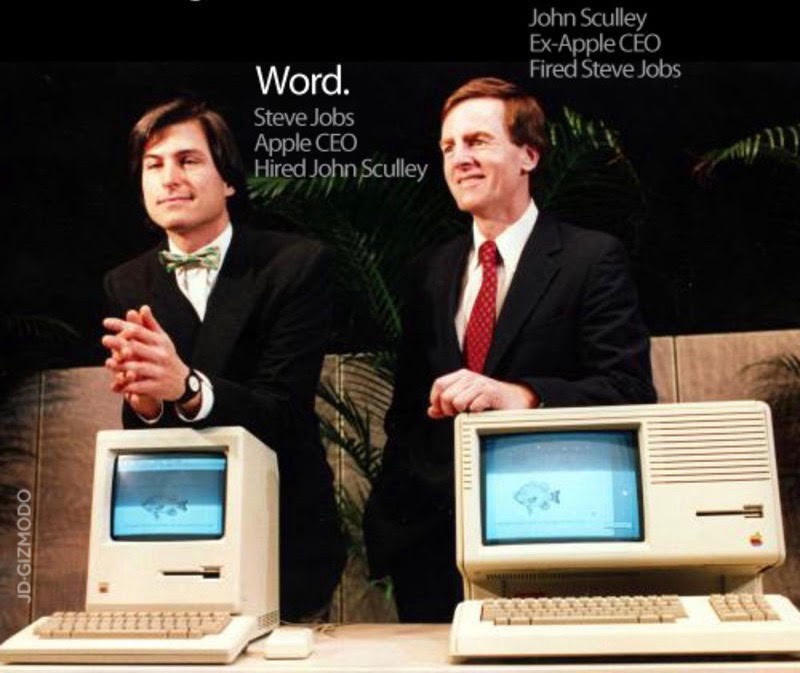“Sometimes things happen and they don’t seem consequential at the moment…”
Shares Career & Business Wisdom from His Journey
Moshe: What happened in your early life that set you up to become the President of Pepsi, and then later the CEO of Apple?
John: When I was very young I really didn’t want toys. All I wanted was electronic parts, so I can build things. I discovered, I was better at taking things apart and turning them into something else, but when I put them back together I always had parts left over. So, I realized I was not going to be a great engineer. I didn’t have a precise, detailed mind, like my wife, who’s an engineer, does. I was more of a designer. I liked to figure out different ways of doing things, with the idea that there had to be a better way. I can sit designing things ever since I was a child. I built go carts, I built early television sets. I built one of the first Television sets. When they were sending out signal, which was called sequential television. When you had a spinning wheel of red, green, and blue. Then when I was 14, I invented a Color television cathode ray tube, and I applied for a patent on it. I eventually got knocked out by Dr. O.R. Lawrence, he was somebody that knocked out 8 of my 12 claims. He eventually sold his invention to ABC Paramount. Back then ABC and Paramount were a joint company. They eventually sold it to SONY. Years later when I met Akio Morita, the founder of SONY. He had remembered the story that when I was a kid, I had invented something similar to what Dr. Lawrence did, so he introduced me to the team who were still at Sony, the original Sony trinotron team. I was always inspired by ideas, always curious. Curiosity was who I was. I was not a particularly good athlete. I was always thinking about things in my head, and building things, more than I was in sports. I had a really bad stammering problem. I couldn’t talk. So, when I was a kid I couldn’t even talk on the telephone. I couldn’t even talk in the classroom, I was very embarrassed. The teachers would say I was stupid because I couldn’t answer the questions. It was very humbling, to put it mildly. But, then it turned out that I eventually went to a medical hypnotist and learned how to get over my stammering. By the time I got to college. I discovered I was actually very good at mathematics. I discovered I was an exceptionally good student when it came to math. When I was in graduate school, I was doing Monte Carlo game theory, Mark off chain analysis, basic statistical modeling, and things like that. Which didn’t seem to have any purpose in those days, but as we know today they are kind of fundamental algorithms. So, sometimes things happen and they don’t seem consequential at the moment, as things that happened to me in my childhood, but so much of what I do today traces back to what I was very interested in when I was very young.

Moshe: What does it take to create a John Sculley career?
John: It’s not very complicated. It takes incredible curiosity, it takes a willingness to work extremely hard. It takes I think a respect that there are other people who can do things better than you can, and if you can work together, great companies are always built by teams. It’s not one individual, its always a team. The team doesn’t have to be exactly like you. You have to say, “What am I good at?”, “What’s missing in the company?”, “How do I find someone who’s good at the things which I’m not as good at as they are?” Then you’ll find that the most successful companies, they always have a leader, that has a very very clear vision of what she or he wants to accomplish. And that’s why the noble cause is so powerful. The more you can conceptualize the company in terms of something that is noble for the world, and the fact that it makes money is one of the outcomes, it’s not the sole purpose. That’s what attracts the best talent, and gets the best work from people. The brilliance of Steve Jobs was as much about his ability to articulate what he thought could be possible, not probable but possible, and his ability to recruit talent. He was an amazing recruiter of talent.
Moshe: What does it take to build a Steve Jobs or a Steve Jobs like career?
John: It always starts with, “There has to be a better way.”
You think about something and it may be something very simple. Like when steve did the ipod, it wasn’t the first MP3 player. There were lots of mp3 playes before the ipod. But, what he realized is that when Siemens came out with little tiny rotational disk drive that can hold a lot of content on a small miniaturized low power product. Tony was the one who actually designed it, and steve was the one who knew how to explain it in ways non technical people can really understand it. SO he didn’t say here’s the best MP3 you’ve ever seen. He said how would you like to have a thousand songs in your pocket. He was very clever. He went to one of the most powerful industries in the world at that time the Hollywood music industry and was able to convince them to stop selling songs as an album but to sell them individually for 99 cents a song. That’s the whole idea of what became itunes and what became the ipod and things like that. Steve’s ability to connect the dots and to see things that weren’t obvious to other people is part of his brilliance and we can all learn from that.

Moshe: What are Steve Jobs’ Principles?
John:
1. Always start with the customer, not with the technology.
2. It’s more about design more than it is about the technical technology.
Steve actually couldn’t draw. When he came up with an idea.. I can draw. I went to the Rhode Island School of Design and Private School of Architecture at Penn. So, I would draw his ideas often, because he couldn’t draw, but he could visualize. He was a very visual person.
3. Steve loved to use metaphors, because when something didn’t exist he could explain it by using metaphors. Well its like this, its like that.
4. He believed in no compromise. I remember when the first Macintosh was getting ready to go to market and the first mac was inside a sealed case, because Steve didn’t want anyone tampering with it inside, he wanted to be in complete control. One of the engineers was finishing up the motherboard, and Steve looked at him and said “I don’t like this motherboard. I don’t like the way it’s laid out. I want you to go back and do it again.” And the engineer said, “Steve we don’t have any time left. We have to ship the product. Anyway, no one is going to see it, it’s inside a steel case. No one is going to know.” And Steve said, “I’ll know.” And that was Steve Jobs. The original Apple logo which looks like a 4 color logo, because apple was the first color computer, which is why it had a color logo in those days. Steve insisted that it be printed with 6 colors and not 4 colors. And I remember someone saying “Steve, you know how expensive its going to be to print the logo in 6 colors instead of 4 colors, and nobody will know!” He says “I’ll know.” And that was Steve Jobs.
Originally published at medium.com


